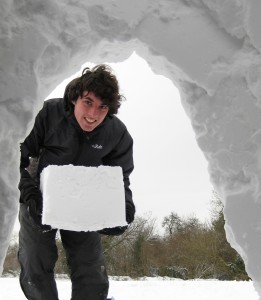This content has been archived. It may no longer be relevant
 I am an ecologist with a strong focus on amphibians and their conservation. Amphibians are the most threatened group of vertebrates globally, with over 30% threatened with extinction.
I am an ecologist with a strong focus on amphibians and their conservation. Amphibians are the most threatened group of vertebrates globally, with over 30% threatened with extinction.
My recent research has focused on the amphibian parasite Batrachochytrium dendrobatidis, where I examined aspects of frog morphology and environmental conditions and how these interact to determine an individual’s susceptibility to infection. In the past I’ve worked with amphibians both back in the UK, as well as in the more exotic habitats of Ecuador and Canada.
For my PhD (supervised by Benedikt Schmidt and funded by BAFU), I will investigate a wide range of topics relating to amphibian conservation. My research broadly falls under 3 themes:
- Assessing trends in amphibian populations
- Identifying causes of decline and assessing the importance of habitat connectivity
- Evaluating the effectiveness of conservation interventions
Some of the questions that I will address include:
- Assessing the importance of accounting for imperfect detection when calculating population trends and examining the degree to which failing to do so biases the magnitude of declines.
- Examining the quality of a citizen science dataset to establish the frequency of false positives and negatives in survey data. Accounting for these will then allow accurate assessment of population trends through space and time.
- Testing for the presence of extinction debts for amphibian populations in the Canton of Zürich by testing whether historic wetland extent better predicts patterns of occupancy than contemporary land use.
- Examining metapopulation dynamics of the European Tree Frog (Hyla arborea) in Canton Vaud to test the importance of connectivity in patch persistence.
- Evaluating the success of a habitat connectivity project for Yellow-bellied toads (Bombina veriegata) using a Mark-recapture study in combination with microsatellite analysis of genetic data collected before and after pond creation in Canton Schwyz.
- Assessing determinants of success in conservation translocations of Midwife Toad (Alytes obstetricans) in relation to factors including the genetic diversity of source populations, numbers of individuals released, and the impact of the fungal pathogen Batrachocytrium dendrobatidis on population persistence.
Much of my research will involve working with existing datasets in the office and working on genetic data in the lab. However I greatly enjoy spending time outside and thankfully a number of my projects allow me to spend time in the field collecting data on the species that I find fascinating.
CV
- 2014- present, PhD candidate, Institute of Evolutionary Biology and Environmental Studies,
University of Zurich, Switzerland. - 2012-2013, MSc (Distinction) Ecology, Evolution and Conservation, Imperial College London (Silwood Park), UK, in collaboration with the Zoological Society of London.
- 2011-2012, Ecologist, AECOM and Aspect Ecology, UK
- 2009-2010, Research Assistant, Farmland Ecology Unit, Game & Wildlife Conservation Trust, UK
- 2007-2011, BSc (First class, honours) Natural Sciences, University of Bath, UK
Publications
- Cruickshank S.S & Schmidt B.R. (2017) Error rates and variation between observers are reduced with the use of photographic matching software for capture-recapture studies. Amphibia-Reptilia 38:3 315-325
- Grant E, Miller D, Schmidt B.R, Adams M, Amburgey S, Chambert T, Cruickshank S.S, Fisher R, Green D, Hossack B, Johnson P, Joseph M, Rittenhouse T, Ryan M, Waddle J.H, Walls S, Bailey L, Fellers G, Gorman T, Ray A, Pilliod D, Price S, Saenz D, Muths E (2016) Quantitative evidence for the effects of multiple drivers on continental-scale amphibian declines. Scientific Reports 6: 25625a
- Cruickshank S.S, Ozgul A, Zumbach S, Schmidt B.R. (2016) Quantifying population declines based on presence-only records for Red List assessments. Conservation Biology 30: 1112–1121a
Researchgate
https://www.researchgate.net/profile/Sam_Cruickshank
